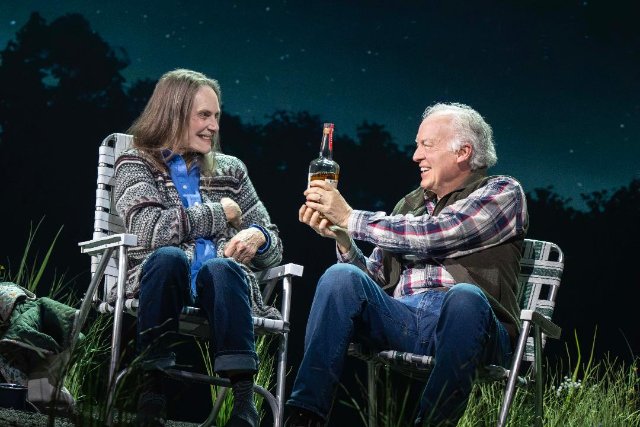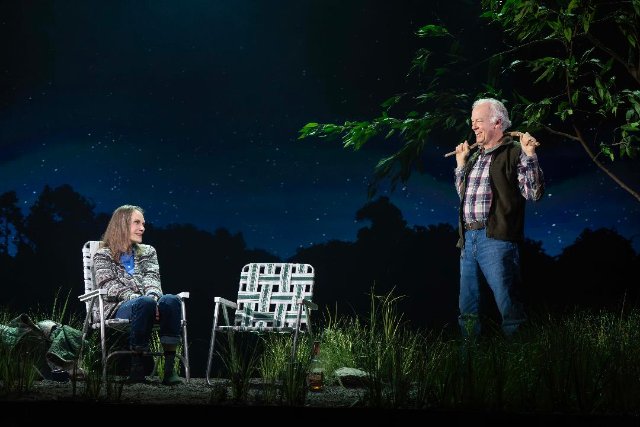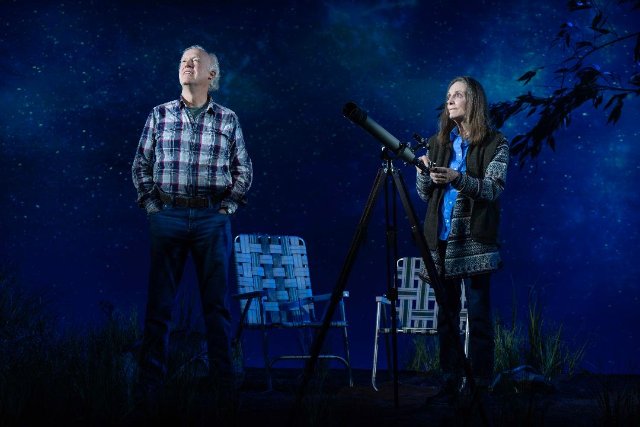David Margulies’ Play, Lunar Eclipse
Directed by Kate Whoriskey
By: Karen Isaacs - Jun 11, 2025
How well do we really know someone else? Even a longtime intimate partner? When and why do we finally ask the questions or share our feelings?
David Margulies’ play, Lunar Eclipse, explores that as George and Em watch a lunar eclipse on the now fallow fields of the family farm.
The brief (80-minute) play opens with George, the wonderful Reed Birney, sitting in a darkened field, sobbing. As the lights come up, we hear sounds, and soon his wife, Em, appears carrying a lawn chair and a basket of provisions – blankets, hot chocolate and more.. She has come to join him, something she hasn’t done in a long time. George loves astronomy.
Projections provide the stages of the eclipse – from when the earth’s shadow starts moving over the moon (which we can’t see from the naked eye) to the increasing amount of the moon’s surface covered by the shadow, to the often red, brown or yellow of the total eclipse, until the earth’s shadow is completely away from the moon.
George and Em’s revelations follow the stages of the eclipse.
The initial shadow is that George is noticing signs that he believes point to serious cognitive issues. While Em tries to convince him that it’s just normal aging, he remains unassured. Before that happens, he wants to see the “Japanese Lantern Effect,” a rare optical effect during a lunar eclipse when the moon is banded in red, yellow, purple, and blue.
At totality, George and Em finally honestly talk about their adopted son, who had multiple addiction issues. It is a painful subject for each of them. The memories are the shadow slowly covering their relationship. Although the son died years ago, the shadow remains. The hint of it is still there. For George, this relationship was difficult; he is finally able to admit that even as a baby, he could not bond with him. He believes that when their son stole things – including George’s childhood, treasured telescope- it was deliberate, not only a quick way to get cash.
What makes this play emotionally moving are the performances of Birney and Lisa Emery. Birney is acknowledged by those in the business as one of our finest actors. His nuanced performance slowly strips the layers away from this man, Em may consider him stoic and unfeeling, but it seems he may have been afraid to open the floodgates of his emotions.
Lunar Eclipse is more a character study by two outstanding performers, but underneath it, the relationship between the long married couple deepens. They finally talk about how Em felt about living on the farm, away from the bustle of the town nearby. George acknowledges his attachment to the land where his father and grandfather farmed and buried their dogs. We sense his regrets and his fears. As we age, it takes courage to admit these things we have hidden because we fear reprobation.
Emery is perfect as the supportive wife who gently tries to reassure her husband that she has been content with their lives and that his fears are unfounded.
Some may find the final scene – a flashback to George and Em’s first lunar eclipse as teenagers unnecessary except to contrast their optimistic younger selves with their current more realistic state. Yet both performers slip easily into the characters as teenagers.
Some may identify aspects of the play that allude to Thornton Wilder’s Our Town, beginning with the names of the characters – George and Emily. The overgrown field may recall the graveyard in Act Three of the Wilder play.
Walt Spangler has created the overgrown field, replete with wild flowers, which Sinan Refik Zafar has populated with the sounds of summer evening. The lighting by Amith Chandrashaker, combined with projections by S. Katy Tucker and original music by Grace McClean, creates an ambiance that allows us to immerse ourselves in the characters.
Director Kate Whoriskey doesn’t feel it necessary to add extraneous movements or actions. She allows her two fine performers to slowly bring out the depths and the pain of the characters.
The 2nd Stage Production is at the Pershing Square Signature Center, 408 West 42nd Street.



